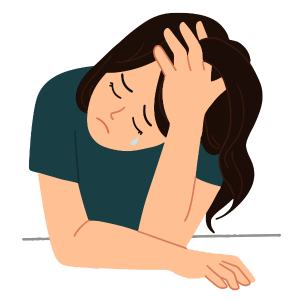Depression is a pervasive and often misunderstood mental health condition that affects millions of people worldwide. While it’s frequently referred to as feeling “sad,” depression is far more complex and insidious. In this comprehensive guide, we will explore what depression is, the causes of depression, symptoms of depression, and treating depression, with the aim of shedding light on this silent but formidable adversary.
What is Depression?

Depression, clinically known as Major Depressive Disorder (MDD), is a serious mental health condition characterized by persistent and profound feelings of sadness, hopelessness, and a lack of interest or pleasure in once-enjoyable activities. It is not merely a passing mood but a persistent state that can significantly impair an individual’s daily life and overall well-being.
What are the Causes of Depression?
- Biological Factors: Depression is often linked to changes in brain chemistry. Imbalances in neurotransmitters like serotonin and norepinephrine can play a significant role in the development of depression.
- Genetic Predisposition: Family history can increase the risk of depression. If you have a close family member who has experienced depression, you may be more vulnerable.
- Environmental Stressors: Traumatic events, such as the loss of a loved one, abuse, or significant life changes (e.g., divorce, job loss), can trigger depressive episodes.
- Chronic Illness: Certain medical conditions, such as chronic pain or a history of other mental health disorders, can increase the risk of developing depression.
What are the common Symptoms of Depression?
Depression encompasses a wide range of emotional, cognitive, and physical symptoms. Some of the most common signs include:
- Persistent Sadness: A pervasive feeling of sadness or hopelessness that persists for weeks or months.
- Loss of Interest: Diminished interest or pleasure in activities that were once enjoyable, including hobbies, socializing, or work.
- Fatigue: Profound and unrelenting fatigue, even after adequate rest, is a hallmark of depression.
- Changes in Sleep Patterns: Depression can lead to either insomnia or excessive sleep.
- Appetite and Weight Changes: Significant fluctuations in appetite and weight, either increased or decreased, are often observed.
- Difficulty Concentrating: Cognitive symptoms include difficulty concentrating, making decisions, or recalling information.
- Feelings of Guilt or Worthlessness: Persistent feelings of guilt, worthlessness, or self-criticism are common.
- Physical Aches and Pains: Unexplained physical symptoms like headaches, digestive problems, or muscle aches can be associated with depression.
What are the options for Treating Depression?
Managing Depression is possible though maybe time consuming, and individuals who seek help can find relief. Some common treatment options include:
- Psychotherapy: Therapy, particularly Cognitive-Behavioral Therapy (CBT), Cognitive Hypnotic Psychotherapy (CHCP) and Interpersonal Therapy (IPT), can help individuals identify and manage negative thought patterns and develop healthier coping strategies.
- Medications: Antidepressant medications, such as selective serotonin reuptake inhibitors (SSRIs) or serotonin-norepinephrine reuptake inhibitors (SNRIs), can be prescribed by a healthcare professional (Psychiatrists) to help regulate brain chemistry.
- Lifestyle Changes: Regular exercise, a balanced diet, and adequate sleep can have a positive impact on mood and overall mental health.
- Supportive Relationships: The support of friends and family can be invaluable in the recovery process. Social connections can help combat feelings of isolation and loneliness.
- Mindfulness and Relaxation Techniques: Practices like mindfulness meditation and yoga can reduce stress and improve emotional well-being.
Depression is a complex and debilitating mental health condition that can affect anyone, regardless of age, gender, or background. It’s crucial to recognize the signs and seek help when needed. Depression is not a sign of weakness but a legitimate medical condition that deserves understanding and compassionate care.
If you or someone you know is struggling with depression, know that there is hope and help available. Reach out to a mental health professional, a trusted friend, or a helpline to start the journey towards recovery. With the right support and treatment, individuals can regain control of their lives, find relief from the burden of depression, and move towards a brighter future.